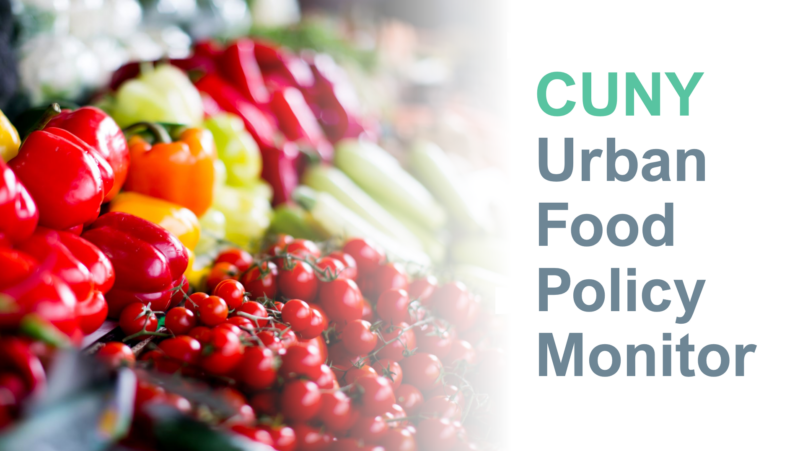IN THIS ISSUE: Featured Interviews: Junk Food Politics: An Interview with Eduardo Gómez; The Campaign Against CUNY’s Pouring Rights Contract with PepsiCo: An Interview with Eman Faris, What is the Health Impact of Precarious Employment on Food Workers in New York City?; An Interview with Emma Vignola on her Award-winning PhD Dissertation/ Policy Highlights / Research Highlights / Video Recordings / Opportunities
EDITORIAL
Greetings CUNY Urban Food Policy Monitor readers and members of our food policy learning community!
Commercial determinants of health have been defined as the ways that for-profit organizations influence human and planetary health. At the CUNY Urban Food Policy Institute, we use this lens to illuminate some of the ways that commercial actors such as food corporations, agribusinesses, supermarket chains, trade associations, and lobbyists shape food choices, patterns of nutritional health, working conditions and democracy here in New York City, the United States and around the world. In this issue of CUNY Urban Food Policy Monitor, we explore some of the ways that the Institute applies the commercial determinants of health lens to our work.
A few weeks ago, the international health journal Lancet released a three-part report on the commercial determinants of health (CDoH). These reports, authored by 35 scholars (including the Institute’s senior faculty fellow Nicholas Freudenberg) from 15 countries provided the most comprehensive assessment on this emerging field of public health scholarship to date. Next year, the World Health Organization (WHO) will release its first report on the global status of commercial determinants.
Defined by the WHO as “private sector activities that affect people’s health,” the CDoH framework has the potential to inform powerful new approaches to reducing the world’s most serious public health problems. Several Institute projects across our portfolio of activities show some of the ways that this framework can be applied to food policy.
Promoting Nutrition and Health Equity
Improving nutritional health and closing the class, racial/ethnic, and other gaps in dietary health requires both increasing access to healthy affordable food and reducing the ubiquity, promotion, and government-subsidized low cost of unhealthy food high in fats, sugar, salt, and other processed ingredients.
To achieve this goal requires taking on the growing power of the food industry and its capacity to influence policy, ideas about food, and the actual food choices on offer. The Institute has led several projects to highlight and challenge this power. This includes research and action to:
- Document inequitable exposure to unhealthy food marketing in New York City.
- Train young people to serve as counter marketers of unhealthy food and beverages.
- Educate policy makers and the public about policies that can make healthy food choices easier and reduce promotion of unhealthy products.
(See also in this issue Q and A with Eduardo Gómez)
Supporting Low Wage Food Workers
Food (and other business sectors) harm health both through their products and marketing practices but also through their labor practices. In New York City, the food sector is a major employer of low wage workers, the majority of whom are people of color, women, and/or recent immigrants. Many face not only low wages but workplace hazards, wage theft, inadequate benefits, and obstacles to unionization. Institute projects that take on these issues seek to:
- Assist CUNY students who are low wage food workers to learn their rights as workers and connect to unions.
- Support food delivery workers to win protection from harmful employer practices.
- Document food industry employer responses to the Covid pandemic.
(See also in this issue Q and A with Emma Vignola)
Addressing Environmental Challenges Through Food Policy
Food policies that procure and serve food produced sustainably, improve food distribution efficiency, encourage resource-conserving and low carbon emissions agriculture, and reduce food waste can reduce climate change and pollution. In some cases, the quest for profits leads food companies to avoid steps that could decrease carbon emissions or other pollution, choosing instead to externalize these costs to their customers and tax payers. At the Institute, students, faculty, and staff have developed activities to:
- Educate the public and policy makers abut food industry and agribusiness practices that contribute to climate change.
- Assist organizations serving small and medium size farmers to develop practices that reduce harmful emissions.
- Encourage cities to develop procurement policies that discourage climate harming food practices.
Advancing Food Justice at CUNY
Through its work within CUNY, the Institute seeks to prepare students to tackle harmful business practices and make CUNY a positive force for change. We seek to provide our students with the knowledge, skills, competencies, and experiences that will enable them to identify and modify commercial forces that make it harder for people to find healthy food or safe, well-paying jobs or contribute to climate change. Our projects:
- Teach about commercial determinants inside and outside the classroom.
- Work to end CUNY’s pouring rights contract with Pepsi. (See Q and A with Eman Faris in this issue)
- Prepare CUNY students to serve as food justice advocates in school and after graduation.
Each of the projects described in the links above or the interviews included in this issue illustrate a few of the many ways that our Institute takes on the commercial forces that make our food system less healthy. Together, they constitute a framework for thinking about how food, food policy, and food systems are shaped by our economic and political systems. Through these activities, our Institute shows how food researchers, health professionals, and health activists can expand their focus from individuals, communities, and governments to the corporations, financial institutions, and other commercial actors that play such an important role in shaping our society’s food choices.
Guest Editor of this Issue: Nicholas Freudenberg, Distinguished Professor of Public Health, CUNY Graduate School of Public Health and Health Policy; Co-founder and Senior Faculty Fellow, CUNY Urban Food Policy Institute
Production Coordinator: Rositsa T. Ilieva, Director of Policy, CUNY Urban Food Policy Institute
Digital Content Specialist: Liv Collins, Communications Assistant, CUNY Urban Food Policy Institute
